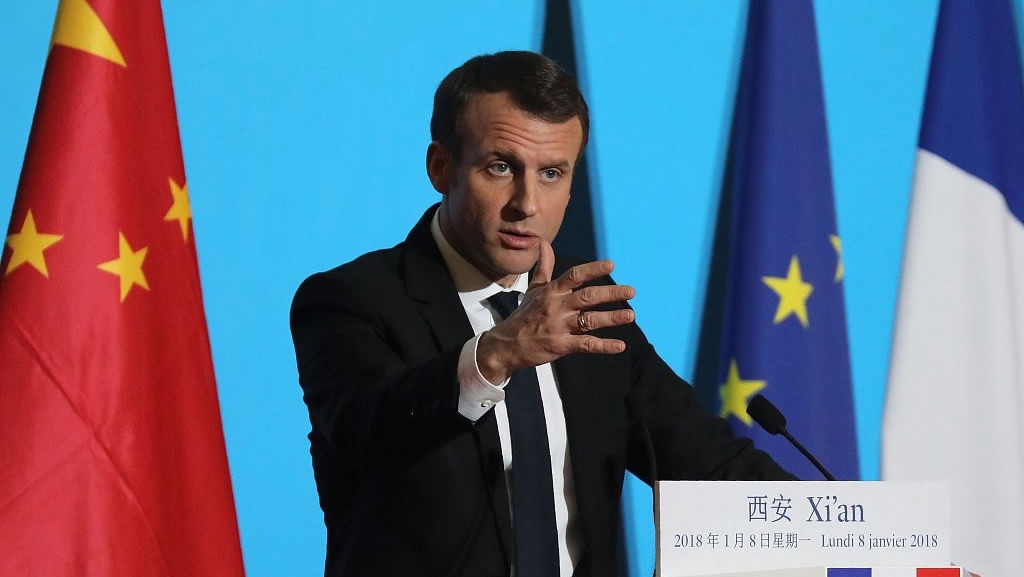Rewind one year and developed nations were teetering on fears of an isolationist, protectionist wave taking hold across the Western world.
Fresh in people's minds were the Brexit vote and Donald Trump's surprise victory in the US presidential election, but by May 2017, a centrist, pro-European, pro-free market, multilateralist – what some might term a globalist – had been elected president of France.
Emmanuel Macron
played his own game to beat the established system – creating his own party, En Marche!, and fiercely opposing the populist policies that others were pandering with.
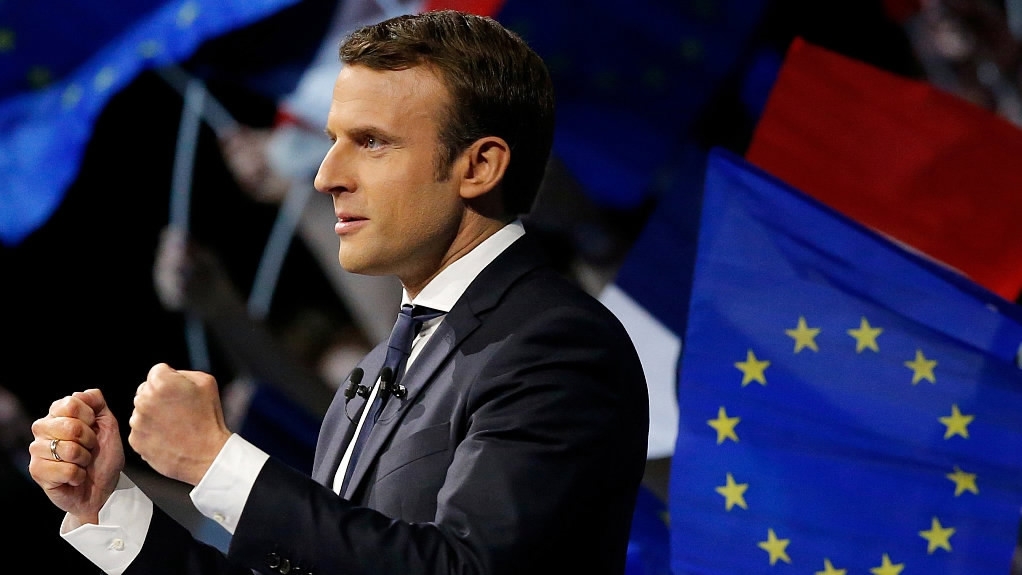
Emmanuel Macron at a political rally in Saint-Herblain near Nantes, France, April 19, 2017. /VCG Photo
Emmanuel Macron at a political rally in Saint-Herblain near Nantes, France, April 19, 2017. /VCG Photo
The 40-year-old’s establishment past – student at the elite Ecole Nationale d’Administration, investment banker, economy minister – was secondary to the insurgent nature of his campaign as he forged his own “neither left nor right” path to the presidency.
And once installed in the Elysee Palace, alongside 64-year-old wife Brigitte,
Macron sought to recast France’s policies at home and boost its diplomatic influence abroad with an ambitious policy agenda.
Seizing opportunities
Macron’s political career has been characterized by identifying openings and diving into them.
After enjoying a swift ascent as a key adviser to Socialist president Francois Hollande from 2012, Macron became France’s economy minister in 2014. He resigned in August 2016, saying: “I have touched the limits of our system, the last-minute compromises, its imperfect solutions. I want today to start a new phase of my fight… It is a choice to be free.”
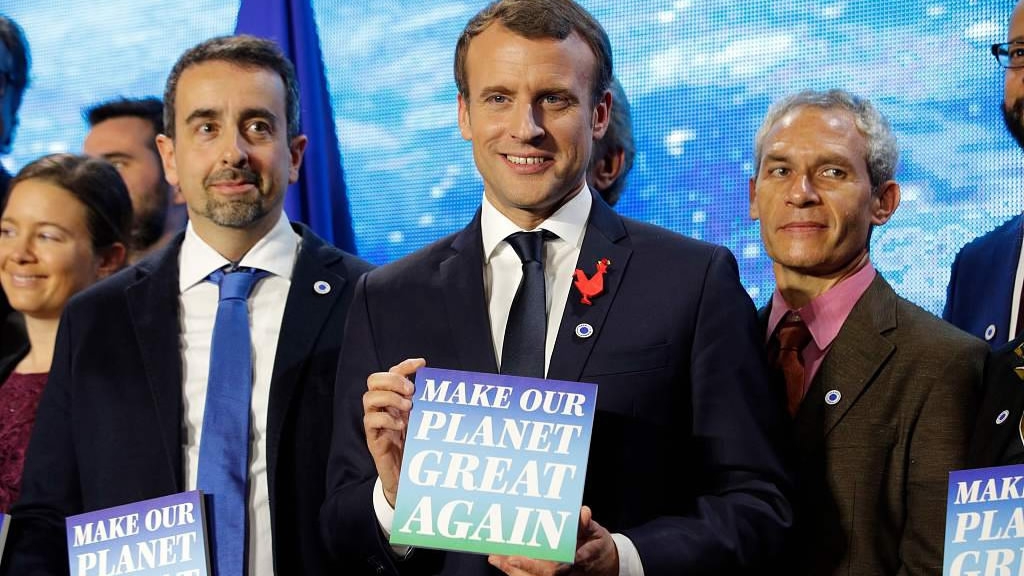
French President Emmanuel Macron holds a sign with the slogan "Make our planet great again" in Paris, December 11, 2017. /VCG Photo
French President Emmanuel Macron holds a sign with the slogan "Make our planet great again" in Paris, December 11, 2017. /VCG Photo
Helped by the weakness of the Socialist party and a scandal-hit Republican candidate, Macron secured a place in the May 2017 presidential election runoff and overcame far-right candidate Marine Le Pen by 30 points.
With the traditional parties and unions in disarray, Macron tackled issues that weighed down previous presidents, notably through business-friendly policies such as tax cuts and labor reforms.
Now the stock market is up, growth is slowly rising and high unemployment is marginally down. Macron’s approval ratings sank in the early days of his presidency, but have since rebounded to around 50 percent.
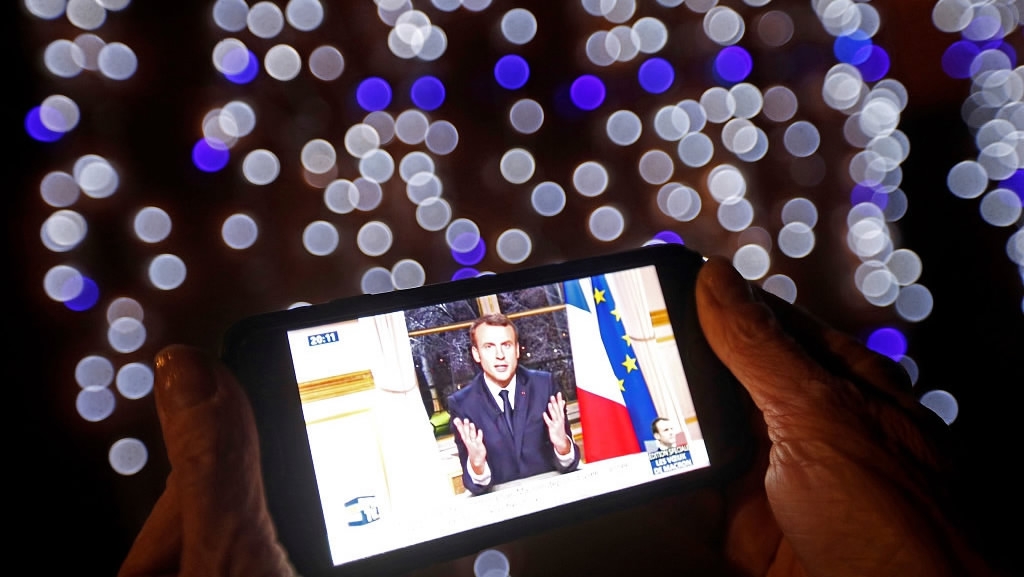
French President Emmanuel Macron is seen on the screen of a phone in Marseille, as he gives the traditional New Year speech, December 31, 2017. /VCG Photo
French President Emmanuel Macron is seen on the screen of a phone in Marseille, as he gives the traditional New Year speech, December 31, 2017. /VCG Photo
In the year ahead Macron plans to continue his reformist agenda by selling stakes in state companies, a politically sensitive move, as well as a string of labor, pension and welfare reforms. Whether opposition forces regroup in time to mount a defense will be key to progress.
'Jolting' the EU
Macron, helped by a void created by Britain’s retreat and Angela Merkel’s difficulties in forming a new German government, together with US isolationism under Trump, is increasingly active on the global stage.
In the EU, Macron’s push for substantial reform and deeper integration – including a common eurozone budget, finance minister and pan-European elections – has had a mixed reception within a bloc in which euroskepticism remains high. Nevertheless, Macron has vowed to “jolt” the EU and has since emerged as the leader driving reform.
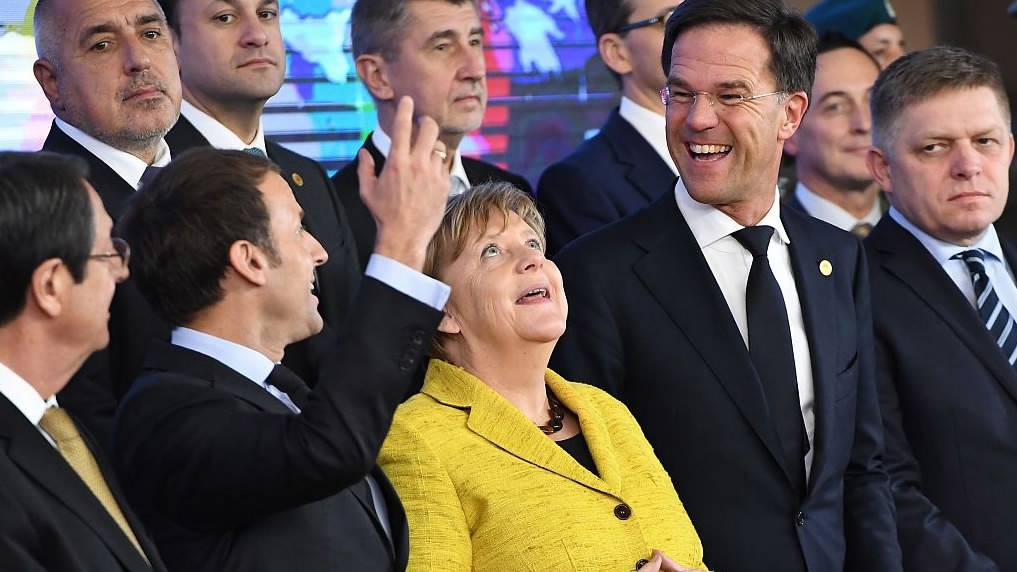
European leaders attend a ceremony on the Permanent Structure Cooperation (PESCO) on the margins of an EU summit in Brussels, December 14, 2017. /VCG Photo
European leaders attend a ceremony on the Permanent Structure Cooperation (PESCO) on the margins of an EU summit in Brussels, December 14, 2017. /VCG Photo
“We need to recover a European ambition to be a more sovereign, more united, more democratic Europe,” Macron said in his New Year’s address.
The retreat of Britain has already opened the door to a common defense force, PESCO, and Macron is planning to create a new grouping in the European Parliament in order to back his case when key EU posts, including EU Commission president, are vacated in 2019.
Macron has made repeated visits to Africa since becoming president, with security in the Sahel a key issue in a region where French troops are operating and the EU is pushing to improve ties through entrepreneurship.
Replacing the US?
The US retreat under the Trump administration has opened space that Macron has seized.
The “not so innocent” prolonged handshake on first meeting Trump made headlines around the world, and Macron hit out at the US president with a “make our planet great again” video message after the US announced its plan to withdraw from the Paris climate deal.
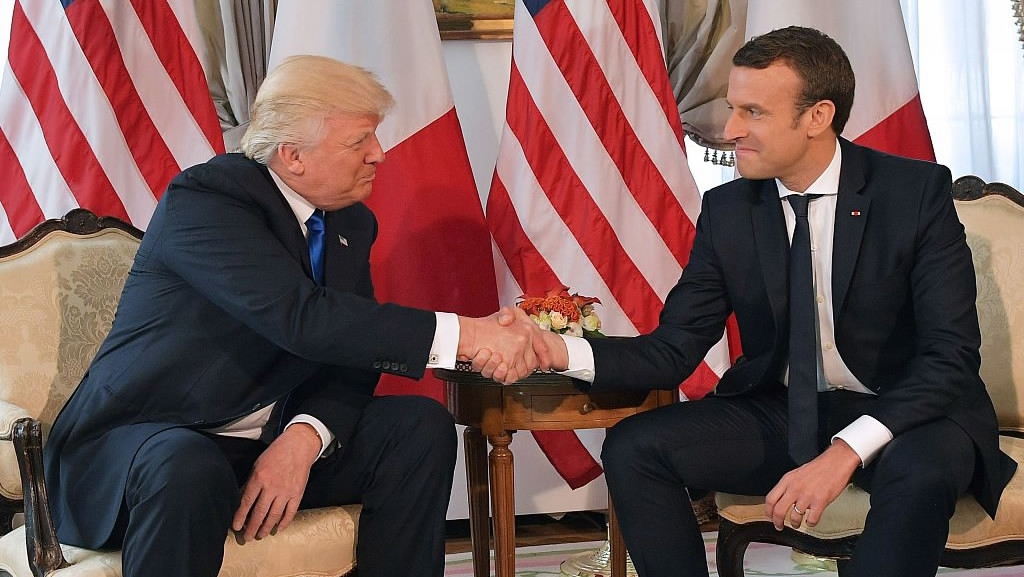
US President Donald Trump and French President Emmanuel Macron shared a 30-second handshake on May 25, 2017. /VCG Photo
US President Donald Trump and French President Emmanuel Macron shared a 30-second handshake on May 25, 2017. /VCG Photo
The French president later wooed Trump by inviting him to the Bastille Day parade in Paris and lunch at the Eiffel Tower, but has simultaneously moved fast to become a leading voice on issues vacated by the US, including multilateralism and climate change.
In the Middle East, Macron played a central role in resolving the strange Lebanon saga in late 2017 and recently criticized the US' decision to recognize Jerusalem as Israel’s capital.
The French president is expected to visit Tehran this year, and as a strong supporter of the Iran nuclear deal, Macron is thought to have offered to help smooth the US-Iran relationship. He could even be positioning France as a mediator in the Palestinian-Israeli dispute, something Hollande tried and failed to achieve.
China visit
Macron’s Asia strategy is less defined, and the French president will seek to flesh out his vision during his trip to China on January 8-10.
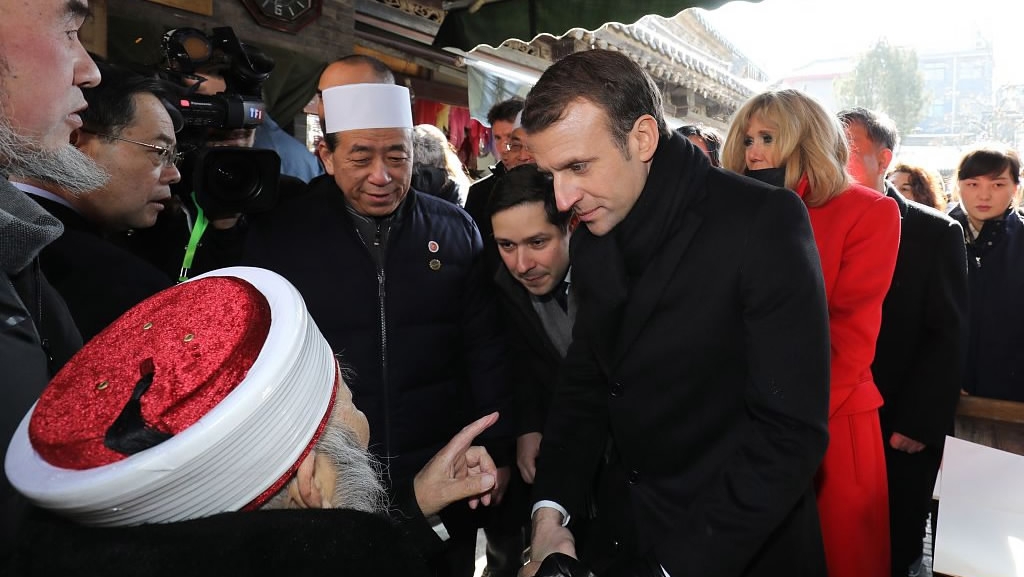
French President Emmanuel Macron shakes hands with a local elderly imam during a visit to the Great Mosque of Xi'an in northwestern China on January 8, 2018. /VCG Photo
French President Emmanuel Macron shakes hands with a local elderly imam during a visit to the Great Mosque of Xi'an in northwestern China on January 8, 2018. /VCG Photo
“China-France relations extend far beyond the bilateral scope and take on global significance,” Chinese Foreign Ministry spokesperson Geng Shuang stated on January 5.
In a year in which Macron will follow the Chinese president in addressing the World Economic Forum in Davos, climate change and the Belt and Road Initiative, as well as trade, investment and the Korean Peninsula, are likely to be central to discussions with Xi Jinping.

